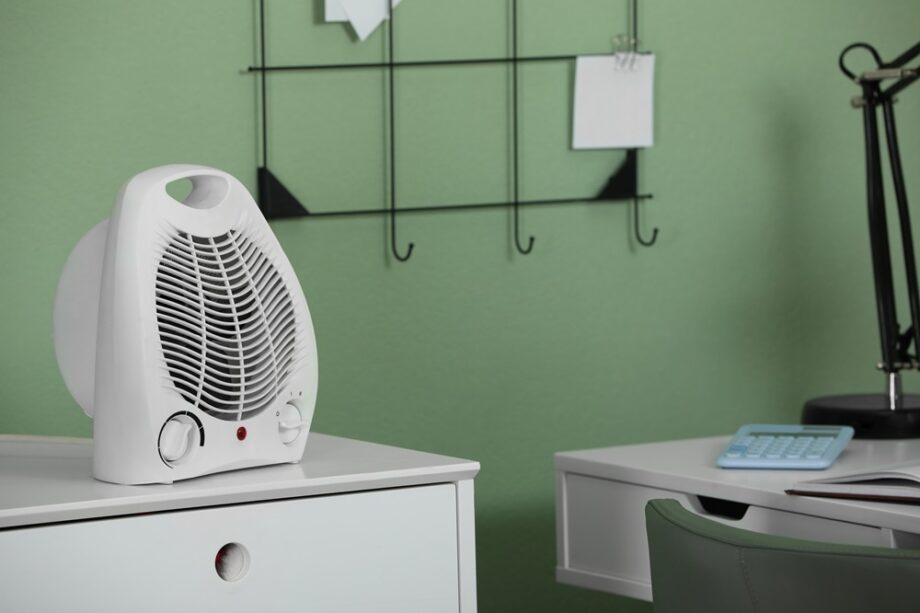Space Heater 101: Staying Warm & Safe

In cold climates such as Michigan’s, space heaters are a popular choice to provide extra warmth because they are easy to operate, are affordable, and direct warmth right at the user. They are a viable option to heat a chilly room or supplement a substandard heating system. Space heaters can reduce costs by heating a particular room instead of an entire building. They are quick and efficient, and the results are felt almost immediately. Another advantage is that space heaters come in many sizes and are compact and portable.
Space heaters are convenient and safe when operated as designed and intended — unfortunately, they are also specifically responsible for nearly 1,700 house fires, 160 serious injuries, and 70 deaths per year. Often, tragedy follows misuse and misunderstanding the operation of a space heater.
In general, space heaters are safe, especially modern models with built-in safety features like an automatic shutoff. Unfortunately, according to the National Fire Protection Agency (NFPA) , portable heaters are implicated in almost half of all home heating related fires by overheating or causing electrical malfunctions.
Common causes of space heater failure can be attributed to overloading of an outlet, use of extension cords, and using older models that lack safety features such as automatic shutoffs and tilt sensors. Both the Consumer Product Safety Commission (CPSC) and NFPA have issued safety standards for portable heaters and are a good reference to use prior to the purchase of a space heater.
Additionally, heating elements can burn dust particles in the air that can release irritants. This may trigger allergies or respiratory issues for those who use the room. Prolonged exposure to the dry air created by space heaters can also cause minor ailments such as skin irritation and nose bleeds.
When using space heaters, always plug them directly into a wall outlet, and refrain from plugging other high-draw items into that same outlet. Do not plug a space heater into a power strip. Power strips and cheap extension cords are not equipped to handle the extra-current flow and can create a potential fire environment. If an extension cord is necessary, use the shortest heavy-duty cord of 14-gauge wire or larger.
At a minimum, make sure your space heater is designed for indoor use and is certified and labeled by a reputable testing laboratory such as OSHA or UL. Look for basic safety features like:
- Ground-fault Interrupter (GFI switch) to prevent electrical shock
- Sturdy cord
- Shutoff features like tip-over and overheating switches
Continuous running of space heaters is discouraged; most are not designed to operate for longer than four to six hours without being shut down and allowed to cool. The longer space heaters operate without a cool down pause, the more chances the space heater may overheat and create a fire condition. Regardless of how long the unit has operated, if you notice strange odors, unusual sounds, fluctuations in heat, or frequent tripping of circuits, turn off the unit and consider replacement or repair before using it again.
Unvented combustible space heaters are not recommended for use within an office or home and expose occupants to the increased risk of carbon monoxide poisoning. Off-gassing of combustion heaters may also irritate those with asthma or other respiratory ailments. Oxygen depletion sensors that shut off the unit if the oxygen level drops too low are recommended for heaters that use gas, propane, or kerosene.
When using combustion heaters, follow these simple safety tips:
- Insist on using carbon monoxide detectors and oxygen level monitoring sensors, especially in unventilated spaces.
- Have gas and kerosene space heaters inspected annually.
- Never use gasoline.
- For liquid-fueled heaters, use only the approved fuel.
- Follow the manufacturer’s fueling instructions.
- Never fill a heater that is still hot. Do not overfill the heater, allow for the expansion of the liquid.
- Only use approved containers clearly marked for that particular fuel and store them outdoors.
Safety should always be a top consideration when using any type of space heater. Here are some tips:
- Never leave space heaters unattended. Shut off before leaving the room or going to sleep.
- Before using any space heater, read the manufacturer’s instructions and warning labels carefully.
- Inspect heaters for cracked or broken plugs or loose connections before each use. If frayed, worn or damaged, do not use the heater. Unroll the entire cord when in use.
- Space heaters are only meant to provide supplemental heat and should never be used to warm bedding, cook food, dry clothing, or thaw pipes.
- Heaters must be kept at least three feet away from anything that can burn, and five feet from where children play or congregate.
- Locate space heaters out of high traffic areas and doorways where they may pose a tripping hazard.
- Place space heaters on level, flat surfaces. Never place heaters on cabinets, tables, furniture, or carpet.
- Always unplug and safely store the heater when it is not in use.
It is important to note that space heaters can only do so much. They have a few inconveniences that should be considered. They require constant attention when in operation and although much safer to use than even a few years ago, they are considered fire and burn risks, especially when used outside the manufacturer’s recommendations.
Use space heaters cautiously and be sure to educate yourself on which model is best for your use before purchasing.